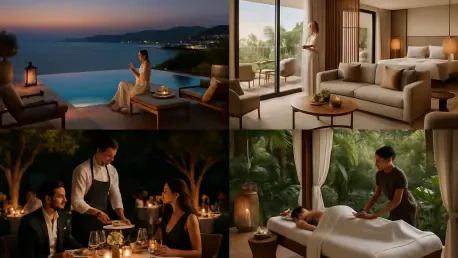I’m thrilled to sit down with Katarina Railko, a true luminary in the world of luxury hospitality and entertainment. With a career honed in travel and tourism, Katarina has become a leading voice in the industry, particularly in events, expos, and conferences. Her deep understanding of what drives success in luxury markets makes her the perfect person to discuss the evolving landscape of high-end hospitality and real estate investment. In our conversation, we explore her insights on strategic partnerships, the integration of wellness and sustainability in luxury offerings, and the unique challenges of global markets, as well as her vision for creating unforgettable guest experiences.
How did your journey in luxury hospitality and tourism shape your perspective on what defines true excellence in this industry?
My journey has been incredibly diverse, spanning various roles across travel, tourism, and high-end hospitality. What I’ve learned is that true excellence lies in creating experiences that resonate on a personal level with guests. It’s not just about opulence or extravagance; it’s about anticipating needs, curating moments, and ensuring every touchpoint reflects authenticity and care. My time working on international projects taught me the importance of cultural nuance—luxury means different things in different parts of the world, and understanding that is key to standing out.
What excites you most about the current trends in luxury real estate and hospitality investments?
I’m really excited about the growing emphasis on experiential luxury. Investors and developers are realizing that it’s not enough to build a beautiful property; you need to offer something unique—whether it’s a wellness retreat, a cultural immersion, or a sustainable ethos. There’s also a surge in mixed-use developments that combine hospitality with residential and lifestyle elements, creating ecosystems where people can live, work, and play. This holistic approach is redefining luxury, and I think it’s a fantastic opportunity for innovation.
How do you see wellness and sustainability influencing the future of luxury hospitality projects?
Wellness and sustainability are no longer just buzzwords—they’re non-negotiable for today’s luxury consumer. Guests expect properties to prioritize their health, whether through spa facilities, organic dining, or spaces that promote mental well-being. Sustainability, too, is critical; travelers want to know that their stay aligns with eco-conscious values, from energy-efficient designs to zero-waste practices. The challenge is integrating these elements without compromising the sense of indulgence that defines luxury. I believe the future lies in seamless, thoughtful design that makes these priorities feel effortless.
When it comes to global luxury markets, what do you think are some of the biggest challenges in creating tailored experiences for diverse cultures?
One of the biggest challenges is striking the right balance between global standards and local authenticity. For instance, a luxury property in Miami might focus on vibrant, social experiences, while one in a remote Asian destination might emphasize serenity and privacy. Understanding cultural expectations around service, design, and hospitality is crucial. It requires deep research and often local partnerships to ensure you’re not just imposing a one-size-fits-all model. Getting this right can turn a property into a destination in its own right.
Can you share your thoughts on what makes a partnership between a real estate firm and a hospitality brand truly successful?
A successful partnership hinges on shared vision and mutual respect. Both parties need to align on the core values of the project—whether it’s innovation, luxury, or sustainability. Communication is also vital; real estate firms bring expertise in development and investment, while hospitality brands understand operations and guest experience. When these strengths complement each other, you create something greater than the sum of its parts. I’ve seen partnerships thrive when there’s a willingness to adapt and learn from each other, rather than sticking rigidly to predefined roles.
How do you approach the balance between maintaining a brand’s identity and adapting to new markets or trends in luxury hospitality?
It’s a delicate dance. A brand’s identity is its foundation—guests come to you because of what you stand for, whether it’s timeless elegance or cutting-edge innovation. However, markets evolve, and so do guest expectations. The key is to stay true to your core while finding ways to resonate with new audiences. For example, introducing local design elements or cuisine can make a property feel relevant in a new market without diluting the brand’s essence. It’s about evolution, not reinvention.
What role do events and conferences play in elevating a luxury hospitality brand’s presence in the market?
Events and conferences are powerful tools for building a brand’s reputation and network. They offer a stage to showcase what makes a property or brand unique—be it through hosting high-profile expos, cultural festivals, or industry summits. These gatherings also attract a discerning clientele and create buzz, positioning the brand as a leader in the luxury space. From my experience, curating memorable events can turn a one-time visitor into a lifelong advocate, as they associate your brand with exceptional moments.
What is your forecast for the future of luxury hospitality and real estate investment over the next decade?
I believe we’re heading toward an era of hyper-personalization and conscious luxury. Technology will play a huge role—think AI-driven guest profiling to tailor experiences before someone even checks in. At the same time, there will be a stronger push for sustainability, with net-zero properties becoming the norm rather than the exception. Investment-wise, I see a shift toward emerging markets as affluent travelers seek out new, undiscovered destinations. The brands and firms that can blend innovation with authenticity will lead the way, creating spaces that feel both aspirational and responsible.









